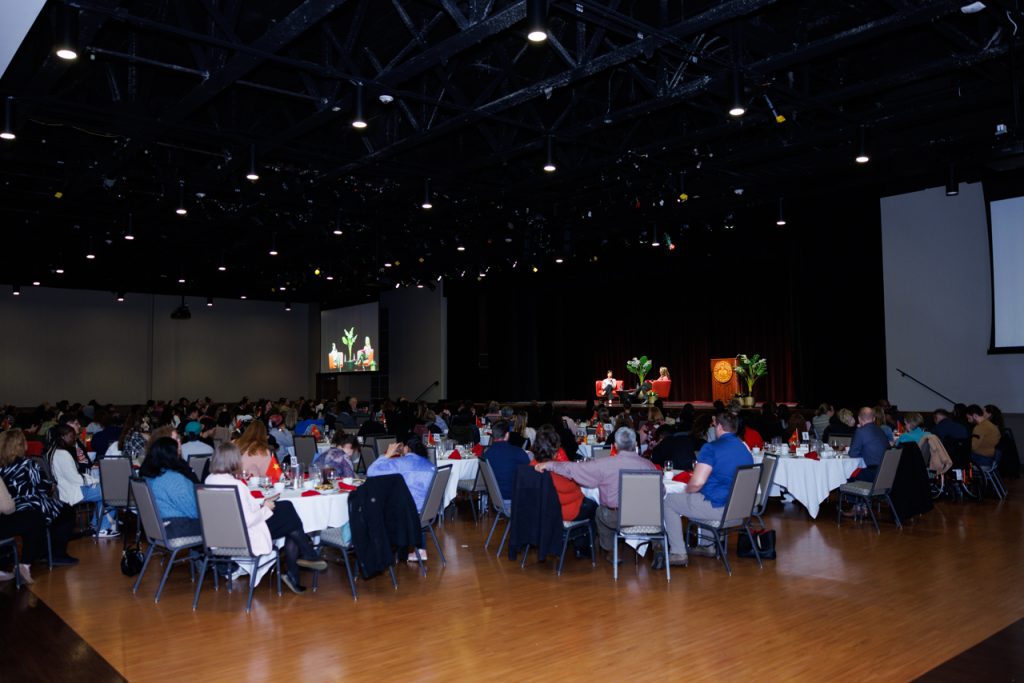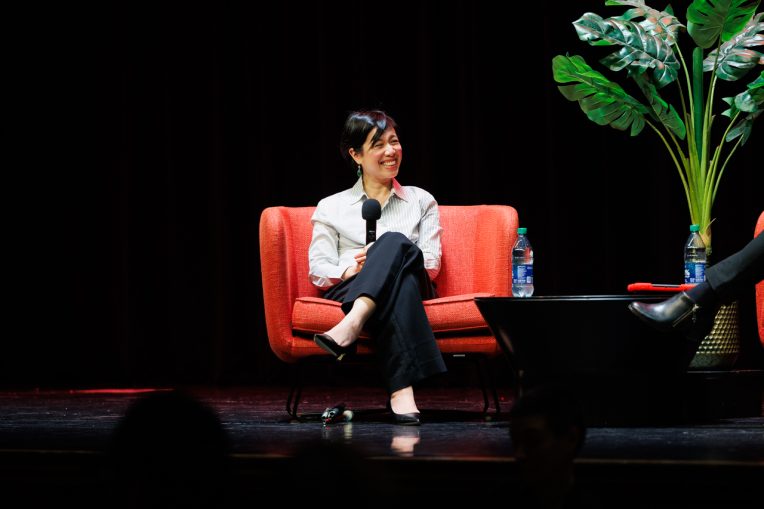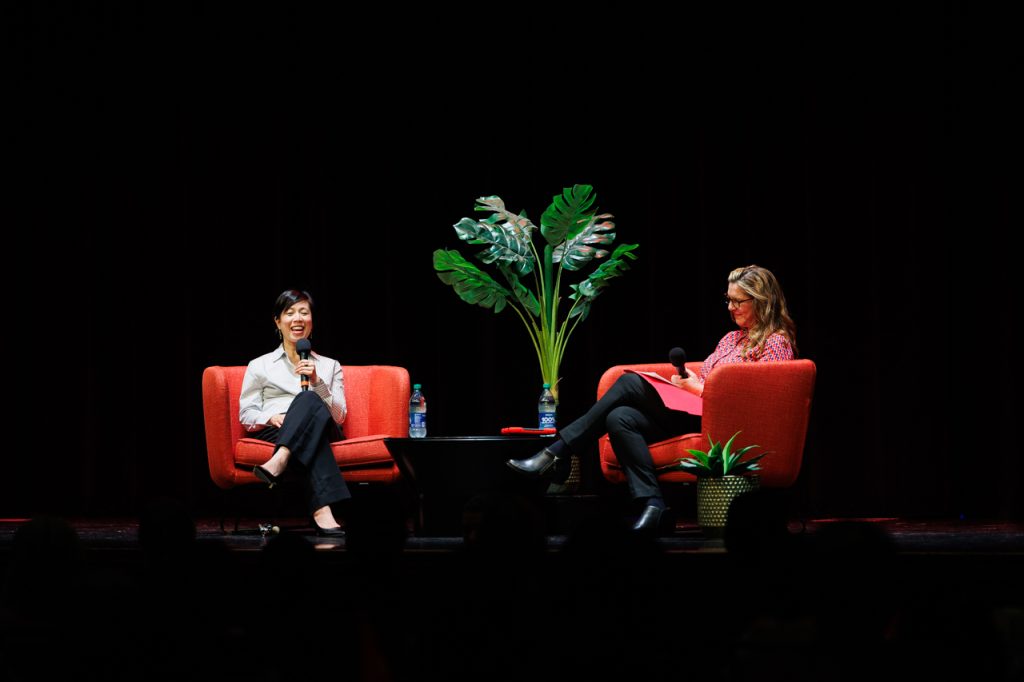Christine Ha, a blind chef whose parents immigrated from Vietnam, embraces her personal identities like the ingredients for a deliciously unique recipe.
“I’m all of these things, and that makes me a unique human being,” Ha said. “I think all these differences, instead of thinking of them as sources of shame, we should think of them as something to celebrate. What makes our world so fascinating is how we’re all so different, but at the same time we are all still human beings.”
The winner of MasterChef’s third season on FOX, Ha was the guest speaker for Illinois State University’s Asian and Disability Awareness Cultural Dinner, Monday, April 1. Sarah Schafer ’96, M.S. ’98, the associate director of Student Access and Accommodation Services, moderated an hourlong Q&A with Ha in front of nearly 300 people in the Bone Student Center’s Brown Ballroom.
Guests were treated to a variety of Asian cuisine catered by Event, Management, Dining, and Hospitality, including cà ri gà (Vietnamese chicken curry) prepared using Ha’s recipe.
“Losing one sense makes your brain adapt to depending on the remaining senses that are strong to help you take in your environment. And so, that indeed helped me fine-tune my cooking skills.”
Christine Ha
During the talk, Ha reflected on the challenges she faced as the daughter of immigrant parents and how that experience shaped who she is today. As a child, Ha said she didn’t feel “Vietnamese enough” at home or “American enough” at school.
“My mom would cook great Vietnamese food, but I took it for granted,” Ha said. “She would pack my lunch, and then I would go to school, and I would always try to trade braised pork belly or my egg rolls with fish sauce for my classmates’ bologna and American cheese with Miracle Whip on white bread or a peanut butter and jelly sandwich on white bread or a bag of chips. I would always try to trade, and no one wanted my stinky food.”
But as Ha grew older, she became more comfortable with her intersecting identities.
“It comes with learning more about your heritage and where you came from and being proud of both where you’ve come from and also where you are now and understanding that there is such a thing as being both,” Ha said.
Ha said she embraced her Vietnamese roots in college when, out of necessity, she taught herself to cook.
“I moved out of my freshman dorm at UT (the University of Texas) in Austin into a small apartment on the west side of campus with a couple of roommates and realized that I no longer had the dorm cafeteria to rely on,” Ha said.
She picked up some Vietnamese cookbooks and attempted recipes that her mom, who died unexpectedly of cancer when Ha was 14, had perfected. Ha’s first few tries were admittedly unsuccessful, but she kept at it until she “finally cooked something good”: Vietnamese ginger braised chicken, which she shared with her roommates and friends.
“I remember then, I still had vision, and I looked around the table and saw their satiated smiles, and they seemed happy,” Ha said. “I felt like something just kind of clicked in me that I realized, I enjoy serving other people and making other people happy. And I could do this with food.”

After earning a bachelor’s degree in business administration and finance, Ha began working in the corporate world. But in her mid-20s, Ha was diagnosed with Neuromyelitis optica, a rare condition in which a person’s immune system damages their optic nerves and spinal cord. Within three years, she was almost completely blind.
“It was at this time when I started learning how to cook that I started losing my vision, and I had to leave my corporate job and then had to decide ‘What now?’ because my vision never came back,” Ha said. “I decided I wanted to do something completely different.”
Using adaptive tools in the kitchen, Ha continued cooking while also returning to school to pursue a Master of Fine Arts in creative writing. She then put graduate school on hold to compete in the third season of MasterChef, a televised cook-off in which amateur chefs compete in a series of challenges overseen by a panel of judges including Gordon Ramsay, an internationally renowned chef known for his fiery personality.
“I thought if anything, it would be a really good experience to have a funny story to come home and write about,” Ha said. “I did not expect to get as far as I did.”
Ramsey, who isn’t known for giving many compliments, told Ha that she cooked like “an angel” on her way to winning the show’s $250,000 prize and a cookbook contract. Reflecting on her development as a chef, Ha said losing her vision heightened her senses for “the nuances of every bite” in the kitchen.
“Losing one sense makes your brain adapt to depending on the remaining senses that are strong to help you take in your environment,” Ha said. “And so, that indeed helped me fine-tune my cooking skills.”
Since winning MasterChef in 2012, Ha has published a New York Times Bestselling cookbook, Recipes from My Home Kitchen, and she is working on a second. Ha and her husband also opened two restaurants in Houston: The Blind Goat and Stuffed Belly. And Ha has served as a culinary arts envoy overseas for the American Embassy and was a co-host on the Canadian cooking show Four Senses and a judge on MasterChef Vietnam.
“Winning MasterChef sort of turned my life upside down and gave me a lot of opportunities in the culinary industry,” Ha said.
While growing her culinary career, Ha has also taken it upon herself to champion for people with disabilities, including during an appearance before the United Nations.
“After I lost my vision, it’s important for me to be the voice of the people who are disabled or visually impaired so that the world can be more educated,” Ha said. “For me, I always invite people to ask questions because I think education is the most important thing.”
Throughout the many challenges that Ha has faced, she said finding others to help her through has been key.
“Don’t discount the challenges we all face,” Ha said. “We’re not alone. Find a community—other people who have gone through similar things—or a trusted friend or family. I think community to help support you when you’re going through challenges is very important.”
The Asian and Disability Awareness Cultural Dinner was co-sponsored by University Housing Services; Event Management, Dining, and Hospitality; Association of Residence Halls; Student Access and Accommodation Services; Office of the Provost; Office of Equity and Inclusion; Watterson Diversity Coalition; Cardinal Court Leadership Association; Watterson Leadership Association; Hewett-Manchester Diversity Coalition.


